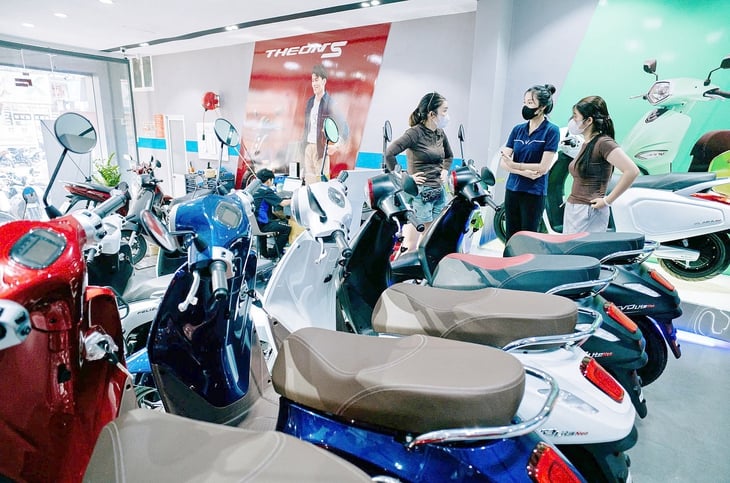
Customers listen to advice about electric vehicles at a dealership on To Ngoc Van Street (Linh Xuan Ward, Ho Chi Minh City) - Photo: THANH HIEP
In that context, the policy of gradually limiting gasoline vehicles in Hanoi and Ho Chi Minh City is expected to pave the way for electric vehicles to accelerate, becoming a popular choice in future urban transportation.
According to RMIT’s forecast, by 2030, the size of Vietnam’s electric vehicle market could reach US$6.7 billion, growing at an average rate of 18% per year. Therefore, experts recommend activating three factors: prior infrastructure, parallel policies, and businesses taking substantial action to meet market demand.
The electric car and motorbike market is bustling.
According to Tuoi Tre, the Vietnamese electric vehicle market is seeing a wave of investment from both domestic enterprises and international giants. In Ho Chi Minh City, a series of electric car showrooms and electric motorbike stores have been opening and selling electric vehicles. Prices range from 15 to 30 million VND for a popular electric motorbike to over 1 billion VND for high-end electric car models.
On social networks, electric vehicle advertisements are everywhere with attractive invitations: "change battery in 5 minutes", "save 3 times more than gasoline cars", "pay in installments with 0% interest"... The atmosphere of buying and selling electric vehicles has also become "hotter". In shopping centers, crowded residential areas or on major roads such as Cach Mang Thang 8, Phan Van Tri, Truong Chinh..., electric vehicle stores have sprung up densely, with customers coming and going busily.
waiting for advice
"Customers keep coming, some watched the livestream yesterday and came to see it in person today. Many people can't wait for the goods to arrive, so they pay a deposit a month in advance. Last June alone, my dealership sold more than 30-40 units, double the same period last year," said Le Van Khoa, manager of an electric motorbike shop in Ho Chi Minh City.
At Vincom shopping malls, Gigamall..., car manufacturers regularly organize car introduction programs. Not only are consumers increasingly interested and ready to "pay" quickly, but on the supply side, the market is also changing rapidly. In particular, VinFast car lines no longer dominate the stage as before because there are more and more new names.
join in
Once a market pioneer, VinFast established a nearly closed electric vehicle ecosystem early on, diversifying its products from Klara, Evo, Feliz, Impes, VF5 to VF9, deploying charging stations, providing battery rental packages and systematic after-sales services. However, from the end of 2023, foreign electric car brands have flocked to Vietnam.
BYD brought in popular models such as Dolphin, Atto 3, Seal. Dongfeng attracted attention with Nammi 01 for only 550 million VND. MG introduced MG4 EV and the Cyberster sports convertible. Not to mention a series of "newbies" such as Wuling, Aion, Geely... are gradually expanding their market share with competitive prices and diverse designs.
VinFast, Selex, Dat Bike... speed up
The purchasing power of electric motorbikes tends to increase sharply, domestic car manufacturers have proactively increased production. VinFast owns a factory with a capacity of 250,000 - 500,000 vehicles/year, ready to expand to 1 million vehicles. Yadea Vietnam has a capacity of 500,000 vehicles/year, Selex Motors 200,000, Dat Bike 100,000, Pega 50,000 vehicles/year...
According to the assessment, the scale of domestic production has approached the capacity to serve the new wave of consumption. Meanwhile, Japanese car manufacturers such as Honda and Yamaha have also begun to enter the market with a few electric motorbike models. Analysts say this move will create a domino effect, making it difficult for brands such as Piaggio, Suzuki, SYM... to stay out of the increasingly heated race.
As the Vietnamese electric vehicle market is booming and is no longer a "playground" for anyone, domestic enterprises are accelerating strongly to dominate the market. For example, VinFast has just announced to increase the production capacity of electric motorbikes to 1 million units/year, while expanding its product line with mini electric cars and trucks.
EC Electric Valve...
Selex Motors is also accelerating the expansion of its fast battery swapping station system, targeting the logistics sector where flexibility and speed are required. Electric motorbike startup Dat Bike also announced plans to triple the current capacity of its factory in Ho Chi Minh City (formerly Binh Duong), while expanding operations to the Western region to meet the rapidly increasing demand for personal transportation.
"Vietnamese people prefer durable, economical and easy-to-maintain vehicles. That's why we invest in a mobile warranty system that reaches every district, instead of waiting for users to bring their vehicles," said Nguyen Ba Canh Son, founder of Dat Bike.
Although the roadmap to limit gasoline vehicles and encourage electric vehicles in Hanoi and Ho Chi Minh City has created a big boost for the market, not all businesses have enough potential to compete in the long term. Mr. Nguyen Huu Phuoc Nguyen, General Director of Selex Motors, warned that if they do not act promptly, Vietnamese businesses will be overwhelmed by Chinese electric vehicles.
According to Mr. Nguyen, although the demand for electric vehicles will certainly increase in the next few years, capital, technology and infrastructure are major barriers.
"Many domestic businesses do not have a complete ecosystem and have difficulty accessing capital to expand production, while Chinese cars are cheap and have thorough investment," Mr. Nguyen worries.
Mr. Hoang Manh Tan, Deputy General Director of Son Ha Group, also said that in order to popularize electric vehicles, in addition to quality products, businesses must support consumers to buy vehicles at reasonable prices, along with adequate charging station infrastructure.
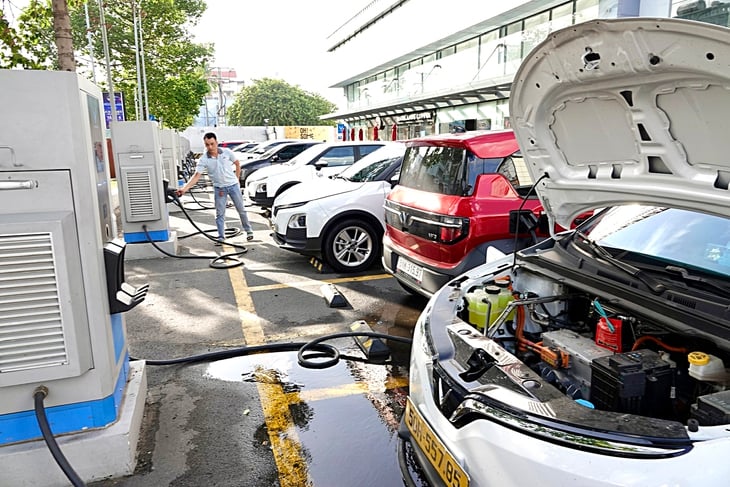
Electric vehicle charging station at a shopping mall in Ho Chi Minh City - Photo: TTD
Many foreign "giants" also join the race.
Market expert Pham Chinh said that when switching to electric vehicles, it is necessary to ensure people's right to choose. The gasoline car market has a wide variety of models and prices, but electric cars still have few options and high prices. "If demand increases too quickly and supply cannot meet it, car prices may increase, causing disadvantages for consumers," Mr. Chinh expressed concern.
However, not only domestic manufacturers but also foreign automakers have begun implementing ambitious plans to not miss out on this potential electric vehicle "piece of cake". BYD, one of the world's largest electric car manufacturers, is considering building a factory in Vietnam. Hyundai is also promoting localization to increase its competitive advantage.
Luxury brands such as Mercedes-Benz, BMW, Audi, Porsche... have successively introduced high-end electric car models to Vietnam, targeting high-income customers. Tasco - one of the major car distributors in Vietnam, is also planning to build charging stations and import a series of electric cars from China, including Geely.
According to a source from an international logistics unit, the Zeekr brand (belonging to Geely Group) is researching the Vietnamese market to launch in 2026, with a strategy of competing on price and fast-charging battery technology. Experts say that the Vietnamese electric vehicle market is in a decisive transition phase, from testing to popularization.
And in that context, thorough preparation not only in terms of products but also in terms of infrastructure, after-sales services, and ecosystems will be the key factors to help businesses stand firm. Mr. Nguyen Ngoc Dat, an expert in the field of technology, assessed that the electric vehicle market in Vietnam is an interesting "stage" when many domestic and foreign businesses are exploiting it.
The green transition trend is irresistible, people have started consuming electric cars. In particular, with a system of charging stations spread throughout every corner of the country, VinFast is leading the game, forcing competitors such as BYD, Geely, Wuling... to accelerate investment or cooperate to develop charging stations to meet the demand.
"Electric vehicles and charging stations are divided into two extremes, just like the phone market. iPhones use the IOS operating system, other products use Android. VinFast cars use the company's charging stations, imported electric vehicles use their own charging stations. In the long run, I think we will unify the use of common charging stations to promote electric vehicles," Mr. Dat said.
Fierce competition in the electric motorbike segment
In the electric motorbike segment, which is VinFast's "home field", the competition is even fiercer. Yadea has just inaugurated a factory in Bac Giang, Selex Motors is promoting the quick battery swap model, while Pega, DK Bike, Dat Bike are continuously launching new products with prices ranging from 15 to 50 million VND. These companies "target" young customers, technology drivers, and shippers - areas where VinFast used to have an advantage.
Users are more interested in electric vehicles
According to Mr. Tran Minh Khanh - market analyst at AVM Vietnam, many people no longer ask: "Are electric cars good?", but have started asking: "Where to charge?", "How much does it cost to replace the battery?", "Is there installment support?"... "Now is the time when customers demand a comprehensive ecosystem, from charging stations to after-sales policies, any unit that does not meet this will be turned away by customers", Mr. Khanh commented.
Technology driver Thanh Long (35 years old) said that after hearing the news that Ho Chi Minh City requires technology cars to use electric vehicles next year, he had to prepare in advance and save to buy an electric motorbike. "There are many options, as long as the car runs well, is easy to charge, and has good financial support, I will choose it," said Mr. Long. Meanwhile, Mr. Nguyen Thanh Binh, an office worker in Ho Chi Minh City, affirmed: "If there is a network like gas stations, I will change immediately."
Many cafes and restaurants have opened electric motorbike charging services to improve the convenience to attract customers and meet the increasing demand for electric vehicles. The price of charging electric motorbikes ranges from 10,000 to 20,000 VND/time, some shops offer free charging to collect from other services when the number of customers increases.
In addition, the electric motorbike accessories market is also taking shape with items such as mobile charging cables, spare battery boxes, charging mounts... being sold by vehicle distributors and e-commerce platforms. Some technology start-ups have also developed applications to help users find the nearest charging station, manage battery levels, and predict charging time...
Policy must be one step ahead
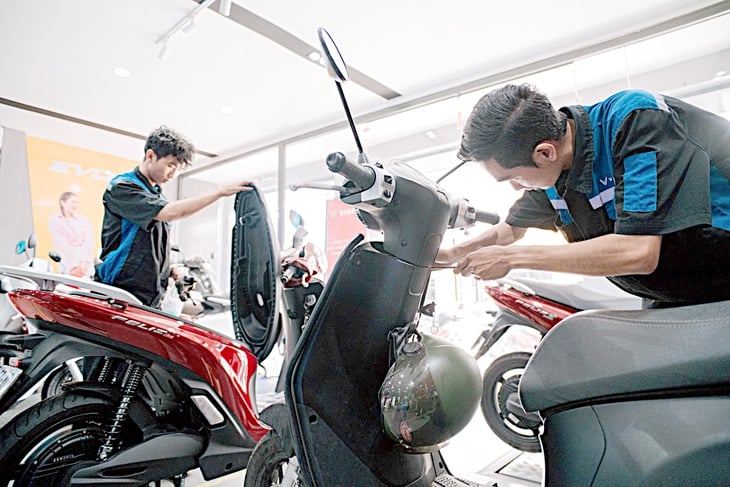
Electric motorbike repair service station at a showroom in Linh Xuan ward, Ho Chi Minh City - Photo: THANH HIEP
Reality shows that the race for the electric vehicle ecosystem is increasingly fierce. VinFast is leading with hundreds of thousands of charging points.
Start-ups like EBOOST, DatCharge, Charge Plus, EVG... are accelerating their expansion. EVN, PVOIL, PV Power, Petrolimex... are testing charging stations at gas stations, apartment buildings, and urban areas. Many localities like Hanoi, Ho Chi Minh City, Hue... require each new urban area to have at least two public charging stations.
According to experts, charging stations are the backbone of green transport infrastructure, without which electric vehicles cannot be popularized. Associate Professor Dr. Ngo Tri Long said that charging infrastructure is part of the energy security strategy.
"Therefore, it is necessary to plan charging stations as a component of the urban area, support taxes, land, green credit, attract PPP and especially have policies to directly support users," Mr. Long suggested.
Master Tran Anh Tung, lecturer at the University of Economics and Finance, Ho Chi Minh City, also said that there should be appropriate credit support policies, subsidies or financial incentives to reduce the burden on people in big cities, where motorbikes still account for a very high proportion of the total number of personal vehicles. Along with that, improving battery technology to shorten charging time, limiting the impact on the number of orders and drivers' revenue.
Meanwhile, Mr. Le Duy Thanh, CEO of a charging equipment manufacturing company, proposed that the State could open a fund to support green technology startups, including electric vehicles, and have preferential land rental policies if businesses build public charging stations.
"That is a practical way to help domestic businesses form a sustainable ecosystem," said Mr. Thanh.
Source: https://tuoitre.vn/nong-cuoc-dua-gianh-mieng-banh-xe-dien-2025072923105312.htm



![[Photo] General Secretary To Lam and National Assembly Chairman Tran Thanh Man attend the 80th Anniversary of the Traditional Day of the Vietnamese Inspection Sector](https://vphoto.vietnam.vn/thumb/1200x675/vietnam/resource/IMAGE/2025/11/17/1763356362984_a2-bnd-7940-3561-jpg.webp)




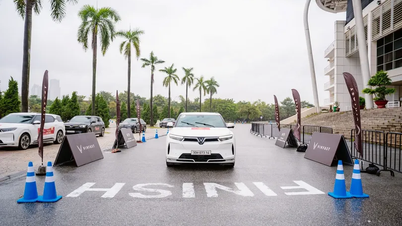

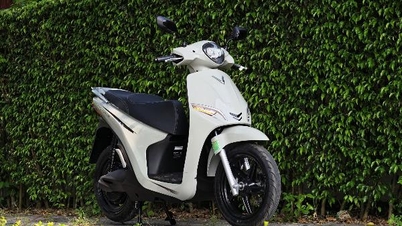



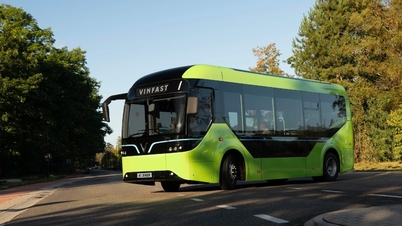

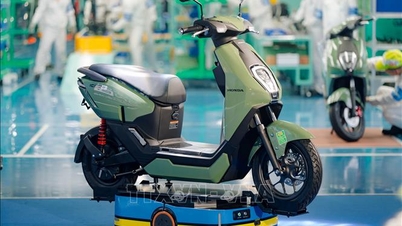

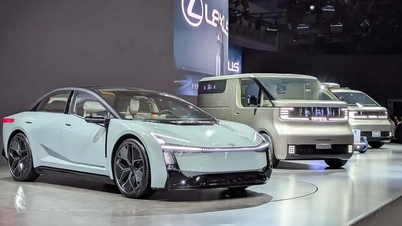

















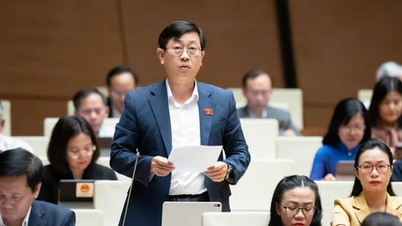







































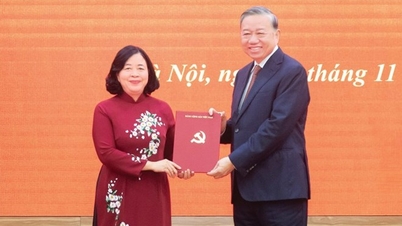

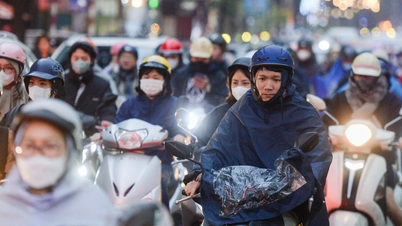
















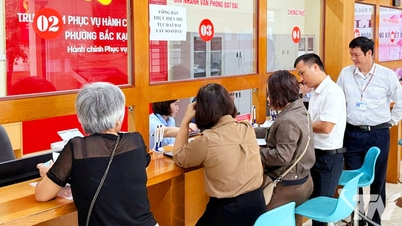





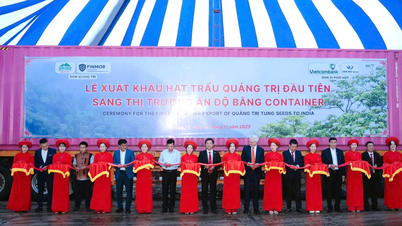












Comment (0)